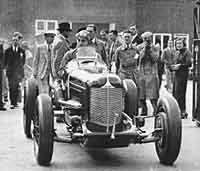
Whitney Willard Straight CBE DFC -
aviator,
racing driver and airport developer
Return to Exeter People Menu
Whitney Willard Straight was born in New York, on 6th November 1912, the son of Willard Dickerman Straight and heiress Dorothy Payne. His father died of influenza at the end of the First World War while serving with the US Army in Europe. Dorothy married Leonard K Elmhurst and together they set up a progressive school at their Dartington Hall home near Totnes.
Whitney attended the school before going up to Trinity College, Cambridge. As a boy he was fascinated by aeroplanes and by the time he was sixteen had already logged 60 hours of solo flying despite not being old enough to hold a pilot’s licence. At university he began racing cars with his friend Richard Seaman who would go on to be Britain’s top pre-war Grand Prix driver.
Students in the thirties were not allowed to have cars so Whitney rode his bicycle to the aerodrome and then flew to race meetings. His first continental race was the Swedish Winter Grand Prix at Lake Ramen. In 1934 he decided to form his own Grand Prix team racing Maseratis painted in the blue and white colours of the USA. He finished 7th in the Monaco GP but went on to achieve victories in the Donnington Park Trophy, the Brooklands Mountain race and the inaugural South African GP at East London. As result of these successes, Straight was invited to join the crack German Auto Union team in 1935, but turned the offer down as he was an outspoken anti-fascist and the Auto Union was funded by Hitler’s Nazi government. He had also promised his fiancée, Daphne Finch-Hatton that he would quit racing. Daphne was the daughter of the Earl of Winchilsea, and her brother Denys, a pilot and big game hunter was one of Karin Blixen’s ‘Out of Africa’ set. He was played by Robert Redford in the film of that name.
Straight now turned to aviation and set up a company, the Straight Corporation, which built and developed airports of which Exeter was one, and which he personally managed. He became a British citizen and prior to World War II joined the RAF. He was seriously injured during the Norway campaign in 1940 but recovered sufficiently to take part in the latter stages of the Battle of Britain. Straight’s 601 squadron flying Hurricanes, (known as the Millionaires Squadron as Max Aitken, Lord Beaverbrook’s son was also a member) was posted to Exeter in September 1940, so he returned to the airfield he had once operated. On 12th December 1940 he shot down a Heinkel bomber while on patrol from Exeter. In all he claimed four enemy aircraft destroyed and shared another with a fellow pilot.
In 1941 Straight was shot down by ground fire over France. He evaded captured and with the help of the French resistance reached Spain before being caught. After a year in a POW camp he managed to escape and this time made it all the way to Gibraltar.
Straight ended the war with the rank of Air Commodore and went on to become managing director of the British Overseas Airways Corporation which later became BA. He had two daughters by his wife and a son from a relationship with Diana Barnato-Walker, who was the first woman to break the sound barrier. He died on 5th April 1979 aged 66.
Contributed by Tony Lethbridge.
 Straight in his racing days.
Straight in his racing days.
 Exeter Airport in 1938.
Exeter Airport in 1938.
│ Top of Page │